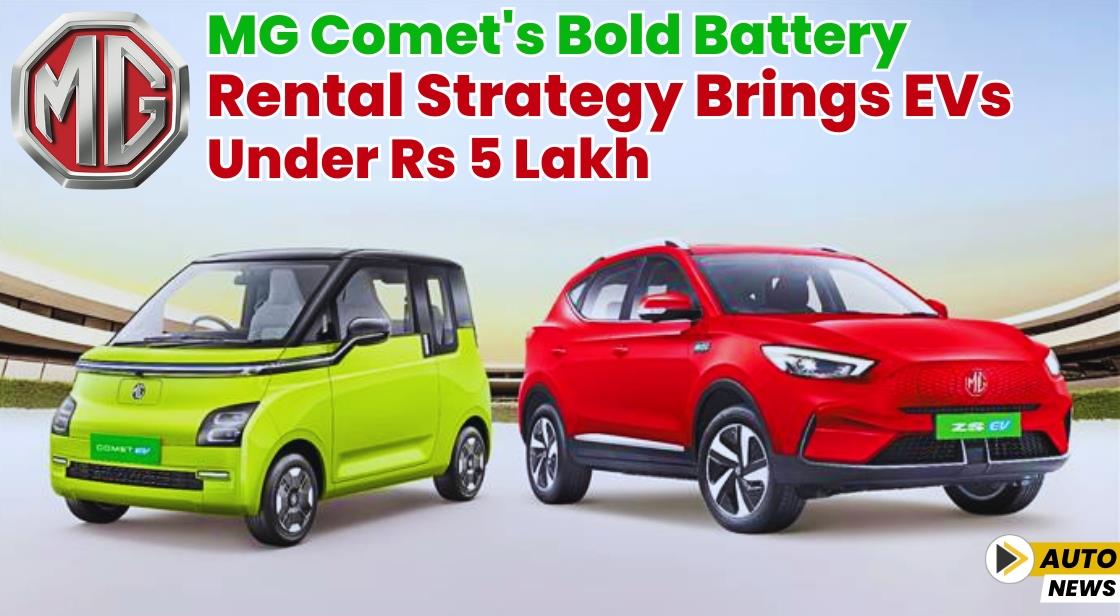MG Comet's Bold Battery Rental Strategy Brings EVs Under Rs 5 Lakh

News Synopsis
JSW MG Motor, a joint venture between JSW Group and China’s SAIC Motor, has made a significant move in the electric vehicle (EV) market with the launch of its Comet Mini at an attractive entry price of Rs 4.99 lakh. This competitive pricing, made possible through an innovative strategy, is designed to reduce the upfront cost of electric cars, making them more accessible to a broader audience. The launch marks a bold step for the company, as they push to make electric vehicles a practical option for budget-conscious consumers in India.
Battery-as-a-Service (BaaS) Program: Revolutionizing EV Ownership
The cost reduction for the MG Comet is part of JSW MG Motor’s Battery-as-a-Service (BaaS) program, which separates the battery from the initial cost of the vehicle. This unique approach allows customers to avoid the hefty upfront price of the battery, which typically drives up the overall cost of electric vehicles. Instead, buyers can pay for battery usage based on kilometers driven, offering flexibility and a more affordable entry point for EV ownership.
This innovative model has been extended to both the Comet Mini and the ZS EV, two of the company’s flagship electric vehicles. The BaaS program slashes the starting price of the Comet Mini by Rs 2 lakh and the ZS EV by Rs 4.99 lakh, making electric vehicles more financially accessible to Indian consumers.
How BaaS Pricing Works: Pay-Per-Kilometer Model
For customers opting for the BaaS model, the price of the battery is excluded from the vehicle’s purchase price. Instead, users pay a rental fee based on the number of kilometers they drive. The rental rates start at Rs 2.5 per kilometer for the Comet Mini and Rs 4.5 per kilometer for the ZS EV, making it easier for users to manage their expenses as they only pay for the distance they travel.
Additionally, users will bear the cost of charging the vehicle, which averages around Rs 1 per kilometer, adding a layer of transparency and control to the overall ownership experience. This pay-as-you-go model is similar to mobile data plans, where customers only pay for the data (or kilometers, in this case) they use beyond the base threshold.
Option to Bundle Battery and Buyback Value
For those who prefer a more traditional ownership model, JSW MG Motor still offers the option to purchase the car with the battery included in the upfront cost. This allows buyers to avoid ongoing battery rental payments, providing them with flexibility in choosing the plan that best suits their needs.
To further enhance the appeal of this pricing model, the company offers a 60% buyback value after three years of ownership. This guarantees customers a return on their investment if they decide to sell their vehicle, adding an additional layer of financial security to the purchase decision.
Expanding BaaS Across Multiple Models
JSW MG Motor initially launched its BaaS program with the Windsor EV, which was priced at Rs 9.99 lakh. In this model, users pay a battery rental of Rs 3.5 per kilometer, with a minimum monthly commitment equivalent to driving 1,500 kilometers. This means customers must make a minimum monthly payment of Rs 5,250, regardless of how much they drive. However, any extra kilometers beyond the 1,500 km threshold will incur additional charges.
JSW MG Motor has partnered with financial institutions such as Bajaj Finserv and Hero Fincorp to manage these additional payments, ensuring a seamless transaction experience for customers.
Accessible EV Ownership: Driving EV Adoption in India
Satinder Singh Bajwa, Chief Commercial Officer at JSW MG Motor India, emphasized the potential of the BaaS model to significantly increase the adoption of electric vehicles in the country. He highlighted the accessibility and affordability that the program offers, making it easier for consumers to switch to electric mobility.
“With BaaS, we have created a platform for easy ownership, making our EVs more accessible than ever. I am confident this unique ownership model will further boost EV adoption in the country,” Bajwa said in a statement. This innovative approach aligns with India’s broader push toward a greener future and is expected to encourage more buyers to consider EVs as a viable alternative to traditional petrol or diesel vehicles.
MG Comet: Reviving India's Affordable EV Market
Although the MG Comet’s price tag of Rs 4.99 lakh positions it as one of the most affordable electric vehicles in India today, it is not the first to achieve this milestone. The Reva, launched in 1994 at an initial price of Rs 2.88 lakh, was India’s first affordable electric car. Manufactured by Reva Electric Car Co., which was later acquired by Mahindra & Mahindra in 2010, the Reva marked the beginning of India’s electric vehicle journey.
Following the Reva, Mahindra introduced the e2O in 2013, priced between Rs 6.5 lakh and Rs 8.5 lakh. Although the e2O was discontinued, it paved the way for the current wave of electric vehicles, including the MG Comet, which is reviving the segment with its attractive pricing and practical urban design.
Specifications and Competitors: Comet vs. ZS EV
The MG Comet is a compact, two-door urban electric vehicle with a range of 230 kilometers per charge. It can seat four passengers, although the space inside is fairly tight, making it ideal for short city commutes rather than long-distance travel. In contrast, the ZS EV is a larger, 4.3-meter SUV with a range of 461 kilometers per charge, positioning it as a strong competitor to other EVs like Tata’s Curvv and BYD’s Seal in India’s growing electric SUV market.
Conclusion: A Game-Changer for India's EV Industry
By launching the Comet Mini under the BaaS model, JSW MG Motor is revolutionizing how electric vehicles are priced and sold in India. The flexibility of paying for battery usage on a per-kilometer basis, combined with an affordable entry price and a strong buyback guarantee, is set to drive higher adoption rates for electric vehicles in the country.









